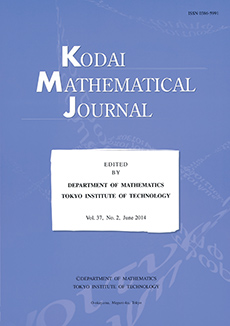Abstract
In this paper we prove the following theorem: % Let $f(z)$ be a meromorphic function of infinite order. If $ \sum \limits_{a \neq \infty} \delta (a,f) + \delta (\infty, f) = 2,$ then for each positive integer $k$, we have % $K(f^{(k)}) = \frac{2k(1 - \delta(\infty, f))} {1 + k - k\delta (\infty, f)},$ % where % $ K(f^{(k)}) = \lim \limits_{r \rightarrow \infty } (N(r, 1 / f^{(k)}) + N(r,f^{(k)})) / T(r,f^{(k)})$ exists. % This result improves the results by S. K. Singh and V. N. Kulkarni [1] and Mingliang Fang [2].
Citation
Weiling Xiong. "Meromorphic function of infinite order with maximum deficiency sum." Kodai Math. J. 27 (2) 105 - 113, June 2004. https://doi.org/10.2996/kmj/1093351318
Information





